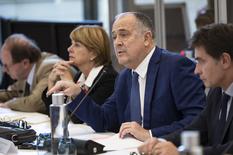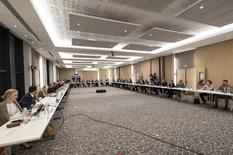- Homepage
- A la Une du Portail
- Stakeholders in Principality fully committed to ensuring removal from FATF “grey list”
Stakeholders in Principality fully committed to ensuring removal from FATF “grey list”
On Wednesday 30 October, the Committee for Coordination and Monitoring of the National Strategy on Money Laundering, Terrorist Financing, Proliferation of Weapons of Mass Destruction and Corruption held a plenary meeting chaired by His Excellency the Minister of State, Didier Guillaume.
All of the relevant government departments, the National Council and representatives from the private sector attended the meeting for an update after the Principality was placed on the list of jurisdictions under increased monitoring (the “grey list”) by the Financial Action Task Force (FATF).
The Minister of State welcomed “the collective commitment of all stakeholders in this complex, technical and constantly changing area.” He thanked participants for the efforts which had already been made, including in terms of legislation and from an operational perspective.
Regular discussions with the private sector are critical, and the various stakeholders were invited to contact the relevant government departments to draw their attention to specific situations that may arise.
The support of key players in the Principality is essential, working alongside the authorities towards a shared goal: removal from the FATF grey list.
In addition, a number of significant measures have already been taken, and there remains a high level of motivation across the board to tackle the remaining challenges and implement the FATF action plan in accordance with the agreed schedule. The Minister of State noted that the Principality had an obligation to succeed here, and that efforts would need to be made to ensure that countering money laundering, financing of terrorism and the proliferation of weapons of mass destruction, and corruption become an integral aspect of the work of all concerned.
In addition to actions on the ground, Monaco must ensure that its practices and legislation are constantly updated, where necessary, to take account of changes in international standards and progress at the European level.
Autres actualités du thème

E-scooters and e-bikes: harmonised regulations to better protect young users

The Embassy of Monaco in Brussels celebrates the 20th anniversary of the accession of H.S.H. Prince Albert II









